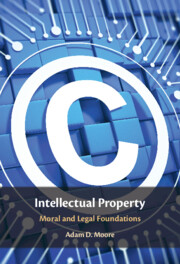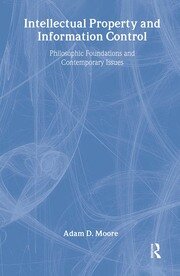| Adam D. Moore |
Professor: Information School Adjunct: Dept. of Philosophy Areas of Specialization
|
Contact Information Office: 330R MGH Email: moore2@uw.edu Phone: 206 221 6141 Information Ethics and Policy: Conference, April 25-26, 2013 |
  |
BRIEF BIO PUBLICATIONS Books Intellectual Property: Moral and Legal Foundations. Cambridge University Press, Feb. 2026, 220 pages.
Privacy, Security, and Accountability: Ethics, Law, and Policy. Edited by A. Moore (Rowman & Littlefield International),
2015, 268 pages. PDF
Privacy Rights: Moral and Legal Foundations (Pennsylvania State University Press, 2010, 237 pages. PDF
Intellectual Property and Information Control: Philosophic Foundations and Contemporary Issues
(Routledge Pub. 2004 paperback, 2001 hardback), 252 pages. PDF
Information Ethics: Privacy, Property, and Power. Edited by A. Moore (University of Washington Press, 2005),
480 pages. PDF
Intellectual Property: Moral, Legal, and International Dilemmas. Edited by A. Moore (Lanham, Md.:
Rowman & Littlefield, 1997), 352 pages. PDF
Articles (* peer reviewed) ....See http://papers.ssrn.com/sol3/cf_dev/AbsByAuth.cfm?per_id=202561
1. "Artificial Intelligence and Academic Cheating: A Stag Hunt for Faculty and Students. " Under review. SSRN
2. "Intellectual Property, Personality, and Misrepresentation." Under review. SSRN
3. "Mill, Rights, and Intellectual Property." Under review. SSRN
4. "The Political Philosophy of Housing Policy." Under construction. SSRN
5. "Ethics, Law, and Policy for Location-Based Augmented Reality Games." Under review. SSRN
6. "The Watchers and the Watched." Under review. SSRN
7. "Taxes Aren't Just Theft, They're Much Worse," in Too Weird to Believe, Too Plausible to Deny, eds Clifford
Sosis (Routledge, 2025), p. 73.
8. “Privacy, Security, and Surveillance,” in Technology Ethics: A Philosophical Introduction and Readings, edited
by Gregory Robson and Jonathan Y. Tsou (New York, Routledge, 2023), p. 160.
9. “Users’ Perspectives on Ethical Issues Related to Playing Location-based Augmented Reality Games: A
Case Study of Pokemon GO,” with Jin Ha Lee and Jason Yip, in the International Journal of Human-
Computer Interaction (IJHCI) Vol. 38 (2023): 1-15.* PDF
10. “Intellectual Property,” Stanford Encyclopedia of Philosophy (2011, 2022).
*http://plato.stanford.edu/entries/intellectual-property
11. “Privacy Rights in Modern America,” in The Bill of Rights in Modern America, James W. Ely, Jr. and David J.
Bodenhamer eds. (Indiana University Press. 2022), Pg. 211-31.* PDF
12. “Free Speech, Privacy, and Autonomy,” in Social Philosophy and Policy, Vol. 37 (2021): 31-51. * PDF
13. “Taxation, Forced Labor, and Theft: Why Taxation is 'On a Par' with Forced Labor,” Southern Journal of
Philosophy, Vol. 58 (2020).* PDF
14. “Privacy, Transparency, and the Prisoner’s Dilemma,” Ethics and Information Technology, Vol. 22 (2020):
211-222.* PDF
15. “Privacy,” The International Encyclopedia of Ethics, edited by Hugh LaFollette (John Wiley and Sons, Inc.,
2019), 1-11.* PDF
16. “Intellectual Property and the Prisoner's Dilemma: A Game Theory Justification of Copyrights, Patents, and
Trade Secrets,” in Fordham Intellectual Property, Media & Entertainment Law Journal, Vol. XXVIII (2018):
831-869. PDF
17. “Privacy, Interests, and Inalienable Rights,” in Moral Philosophy and Politics, Vol. 5 (2018) 327-355.* PDF
18. “Privacy, Neuroscience, and Neuro-Surveillance,” in Res Publica, “Neuroscience and Brain Privacy,” Vol. 23
(2017):159-177.*PDF
--Reprinted in Morality and Moral Controversies: Readings in Moral, Social, and Political Philosophy, 10th
Edition, edited by Steven Scalet, John Arthur (2019).
19. “Privacy, Speech, and Values: What we have No Business Knowing,” in Ethics and Information Technology,
Vol. 18 (2016): 41-49.* PDF
20. “Lockean Foundations of Intellectual Property,” WIPO Journal Special Issue, Vol. 7 (2015): 29-40.* PDF
21. “The Value of Privacy, Security, and Accountability,” with Mike Katell, in Privacy, Security, and Accountability.
Edited by A. Moore (Rowman & Littlefield International, 2015), p. 1-17. PDF
22. “Why Privacy and Accountability Trump Security,” in Privacy, Security, and Accountability. Edited by A.
Moore (Rowman & Littlefield International, 2015), p. 171-181. PDF
23. “Privacy in the Family,” with Newell, B., Metoyer, C., in The Social Dimensions of Privacy, Cambridge
University Press, 2015. Beate Roessler and Dorota Mokrosinska eds. (2015), p. 104-121.* PDF
24. “Intellectual Property and Copyright,” in The Book: A Global History, edited by Henry Woudhuysen and
Michael F. Suarez (2014), p. 183-197.* PDF
25. “Coercing Privacy and Moderate Paternalism: Allen on Unpopular Privacy,” in American Philosophical
Association Newsletter in Philosophy and Law, Vol. 13 (2013): 9-14.* PDF
26. “Privacy, Speech, and the Law,” Journal of Information Ethics, Vol. 22 (2013): 21-43.* PDF
27. “A Lockean Theory of Intellectual Property Revisited,” in San Diego Law Review, Vol. 50 (2012):
1070-1103.* PDF
28. “Drug Testing and Privacy in the Workplace,” in The John Marshall Journal of Computer & Information Law,
Vol. 29 (2012): 463-492. PDF
29. “Privacy, Security, and Government Surveillance: WikiLeaks and the New Accountability,” in Public Affairs
Quarterly, Vol. 25 (2011): 141-156.* PDF
--Reprinted in Social and Personal Ethics, 8th Edition, William H. Shaw ed. (Cengage Learning Pub. 2014),
Cha 12.
--Reprinted in The Library of Essays on Legal Ethics and the Enforcement of Law: Security Ethics,
(Routledge, 2017), Cha. 19.
--Reprinted in Security Ethics, Edited By Katerina Hadjimatheou, Tom Sorell, John Guelke (Routledge Pub.)
2017.
30. “Privacy, Public Health, and Controlling Medical Information,” in Health Care Ethics Committee (HEC
Forum), Vol. 23 (2010): 225-240.* PDF
31. “Ethical Challenges for Technology Managers: Privacy, Consent, and Security,” Knowledge and Policy (KT&P)
special issue (2009) ssrn.
32. “Defining Privacy,” in Journal of Social Philosophy, Vol. 39 (2008): 411-428.* PDF
33. “Personality-Based, Rule-Utilitarian, and Lockean Justifications of Intellectual Property,” in Information and
Computer Ethics, edited by H. Tavani and K. Himma (John Wiley & Sons, 2008), p. 105-130. PDF
34. “Toward Informational Privacy Rights,” San Diego Law Review, Vol. 44 (2007): 809-845.* PDF
35. “Privacy, Intellectual Property, and Hacking: Evaluating Free Access Arguments,” in Internet Security:
Hacking, Counterhacking, and Society, Ken Himma Ed. (Jones & Bartlett Publishers, 2007), p. 235-254. PDF
36. “Privacy,” with Randal Kemp. Library Hi Tech: Special Issue on Information Ethics, Library Hi Tech, Vol. 25
(2007): 58-78.* PDF
37. “Intellectual Property, Genetic Information, and Gene Enhancement Techniques,” in Ethics, Computing, and
Genomics: Moral Controversies in Computational Genomics, edited by Herman Tavani (Jones and Bartlett
Publishers, 2005), p. 282-305.
38. “Information Ethics: An Introduction” with Kristene Unsworth, Information Ethics: Privacy, Property, and
Power, edited by A. Moore (University of Washington Press, 2005), p. 11-28. PDF
39. “Privacy, Liberty, and the Genetic Modification of Humans,” Journal of Philosophical Research, Special
Supplement: Ethical Issues for the Twenty-First Century, Frederick R Adams ed., (Charlottesville: Philosophy
"Documentation Center Press, 2005): 81-95.
40. “Intellectual Property, Privilege, and Natural Rights,” A new introduction to the paperback edition of
Intellectual Property and Information Control: Philosophic Foundations and Contemporary Issues (Routledge
Press, 2004), p. xi-xvii. PDF
41. “Values, Objectivity, and Relationalism,” The Journal of Value Inquiry, Vol. 38 (2004): 75-90.* PDF
42. "Why ‘Just Trust Us’ is a Bad Idea," Philosophy at UW, Vol. 9 (Autumn 2004).
43. “Privacy: Its Meaning and Value,” American Philosophical Quarterly, Vol. 40 (2003): 215-227.* PDF
--Reprinted in Professions in Ethical Focus, edited by Fritz Allhoff, Jonathan Milgrim, and Anand Vaidya
(2nd edition, Broadview Press, 2021), Cha. 39.
44. “Intellectual Property: Theory, Privilege, and Pragmatism,” The Canadian Journal of Law and Jurisprudence,
Vol.16 (2003): 191-216. * PDF
45. “Intellectual Property, Innovation, and Social Progress: The Case against Incentives Based Arguments,” The
Hamline Law Review, Vol. 26 (2003): 602-630. PDF
--Reprinted in The Andean Yearbook of Intellectual Rights, Nº 4, 1011.
46. “Owning Genetic Information and Gene Enhancement Techniques: Why Privacy and Property May
Undermine Social Control of the Human Genome,” Bioethics, Vol. 14 (2000): 97-119.* PDF
47. “Employee Monitoring & Computer Technology: Evaluative Surveillance v. Privacy,” Business Ethics
Quarterly, Vol. 10 (2000): 697-709.*
--Reprinted in Information Ethics: Privacy, Property, and Power. Ed. A. Moore (University of Washington
Press, 2005), p. 251-264. PDF
48. “Privacy and the Encryption Debate,” Knowledge, Technology, and Policy, Vol. 12 (2000): 72-84.* PDF
49. “Intangible Property: Privacy, Power, and Information Control,” in American Philosophical Quarterly, Vol. 35
(1998): 365-378. * PDF
--Reprinted in Information Ethics: Privacy, Property, and Power. Ed. A. Moore (University of Washington
Press, 2005), p. 172-190.
50. “A Lockean Theory of Intellectual Property,” The Hamline Law Review, Vol. 21 (1998): 65-108. PDF
51. “Property and Information Control,” The Proceedings of the Ohio Philosophical Association (1998):109-122.*
52. “Introduction To Intellectual Property,” in Intellectual Property: Moral Legal, and International Dilemmas, Ed.
A. Moore (Rowman & Littlefield, 1997), p. 9-23. PDF
53. “Toward A Lockean Theory of Intellectual Property,” in Intellectual Property: Moral, Legal, and International
Dilemmas, Ed. A. Moore (Rowman & Littlefield, 1997), p. 91-112. PDF
Recent and Forthcoming Presentations
1. "AI, Privacy, and Look and Feel," AI and Privacy, at the University of Puget Sound, Tacoma, WA April 16, 2026.
2. "The Investment Argument for Intellectual Property," The Association of Private Enterprise Education (APEE) 50th Meeting, Las Vegas, April, 2026.
3. "Five Arguments for Intellectual Property," The Association of Private Enterprise Education (APEE) 49th Meeting, Guatemala City, April, 2025.
4. "Mill, Rights, and Intellectual Property," The Association of Private Enterprise Education (APEE) 48th Meeting, Las Vegas, April, 2024.
5. Center for the Protection of Intellectual Property (CPIP) research symposium on philosophical approaches to intellectual property, New York University Law School, June 2023.
6. “Radicalism and Conservatism in the Thought of Herbert Spencer,” Panel Discussion, Liberty Fund colloquium to be held April 21 - 24, 2022 in La Jolla, California.
7. “Free Speech, Privacy and Autonomy,” The Association of Private Enterprise Education (APEE) 46th Meeting, Paris Las Vegas and Bally’s Las Vegas, April 3-5, 2022.
8. “Taxation, Forced Labor, and Theft: Why Forced Taxation is ‘On a Par’ with Forced Labor,” The Association of Private Enterprise Education (APEE) 46th Meeting, Paris Las Vegas and Bally’s Las Vegas, April 3-5, 2022.
9. Center for the Protection of Intellectual Property (CPIP) research symposium on philosophical approaches to intellectual property, New York University Law School, June 2022.
10. Center for the Protection of Intellectual Property (CPIP) research symposium on philosophical approaches to intellectual property, New York University Law School, June 2021.
11. Workshop on Cyber-security Ethics, Prominent Challenges for Cyber-security students, professionals, and scholars. Panelist, July 30th, Aug. 14th, Aug. 29th 2020, Online workshop funded by the DOD, hosted by Steve Cooper, D. Damopoulos, Melissa Dark, S. Wetzel.
12. “A Comment on Mala Chatterjee’s “Understanding Intellectual Property: Expression, Function, and Individuation,” Center for the Protection of Intellectual Property (CPIP) research symposium on philosophical approaches to intellectual property, New York University Law School, July 2020, online.
13. “Freedom of Speech, Self-Government, and Privacy,” Liberty Fund, Inc. conference on Freedom of Thought, July 18-21, 2019 in Park City, Utah.
14. “Intellectual Property, Personality, and Misrepresentation,” presented at the Center for the Protection of Intellectual Property (CPIP) research symposium on philosophical approaches to intellectual property, June 2019, George Mason University.
15. “Taxation, Forced Labor, and Theft,” ("Why Taxation is on a Par with Forced Labor"), American Philosophical Association Eastern Division meetings, January 7-10, 2019.
16. “Free Will, Moral Responsibility, and Causality,” Panel Discussion, Liberty Fund colloquium, Denver, Colorado, June 7 - 10, 2018.
17. “Privacy, Security, and Surveillance: Big Data and the New Accountability,” Keynote Address, Information Ethics Roundtable, Copenhagen, May 17-18, 2018.
18. "'Habermas, Democracy, the Public Sphere, and Patents' a comment on Professor Kali Murray," Philosophical Approaches to Intellectual Property, Center for the Protection of Intellectual Property (CPIP), Hilton Head Island, South Carolina May 31 – June 1, 2018.
19. Panel Discussion, “David Ricardo's *On the Principles of Political Economy and Taxation*” Liberty Fund colloquium, Henderson, Nevada, April 5 - 8, 2018.
Intellectual Property bibliography page.
Privacy bibliography page.